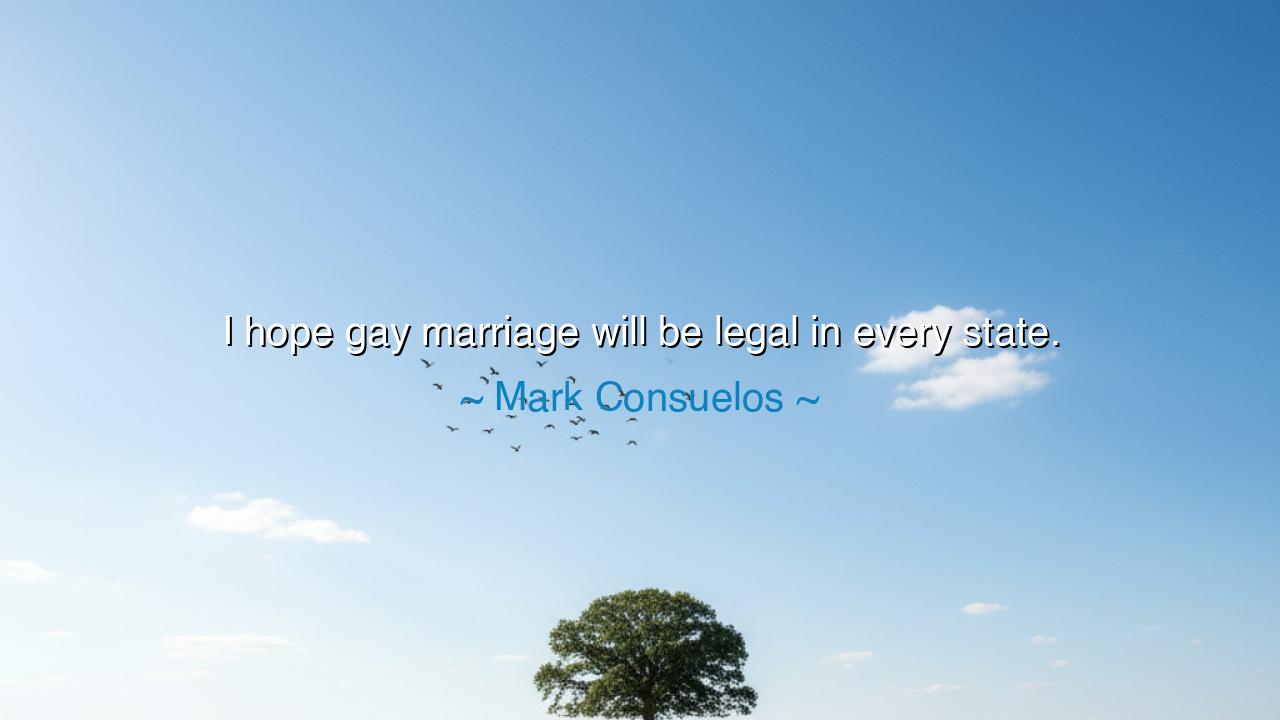
I hope gay marriage will be legal in every state.






There are moments in history when a simple hope, spoken plainly, carries the weight of centuries. When Mark Consuelos said, “I hope gay marriage will be legal in every state,” his words were not the rhetoric of power, but the quiet, steady voice of conscience — a wish that the law might one day recognize what the heart has always known: that love, in its purest form, is equal, sacred, and indivisible. His statement belongs to that lineage of moral yearning that stretches from the prophets to the reformers — the cry that all people be allowed to love and to live with dignity under the same sky.
The origin of this quote lies in an era of transformation, in the years when the question of marriage equality was not merely legal, but spiritual and cultural. Consuelos, an actor known for his roles on screen and his character off it, voiced what millions felt but could not always say aloud. His words arose in a time when the United States still stood divided — some states embracing equality, others resisting it behind the walls of tradition and fear. To say that he hoped for universal legality was, in truth, to express faith in progress, in the moral evolution of humankind — that justice, though delayed, would triumph through persistence and compassion.
To hope for legal recognition of love is not to ask for special privilege; it is to demand that the law cease to stand between two souls who choose to build a life together. For what is marriage, if not a covenant of mutual care, of shared burdens and joys? The ancients understood that love was the root of community, that from it all society draws strength. Yet throughout history, there have always been those who feared difference, who mistook conformity for righteousness. In Rome, the emperor Hadrian grieved openly for his beloved Antinous, though their bond defied custom. His sorrow was immortalized in marble, though his love could not be honored by law. It is that same tension — between what the heart feels and what society permits — that Consuelos’ words seek to resolve.
When he expressed hope for equality in every state, Consuelos was speaking of unity — not just between couples, but between the divided halves of a nation. For law is not merely a code of restrictions; it is the mirror of a people’s soul. A country that denies love denies a part of its own humanity. The struggle for gay marriage was never about contracts or benefits alone, but about recognition — to be seen as fully human, capable of love as deep, as true, as any other. This truth echoes through history’s long march toward justice: from the abolition of slavery to women’s suffrage to civil rights, the same spirit cries out — do not fear equality, for in lifting others, you lift the nation itself.
We must remember, too, that such hope has always required courage. Those who fought for marriage equality — couples who risked ostracism, activists who faced hatred, lawmakers who defied prejudice — were heirs to the ancient warriors of justice, those who stood against the tides of ignorance. In 2015, when the Supreme Court of the United States declared same-sex marriage a constitutional right, it was not only a legal decision — it was the fulfillment of prophecy, the realization of the hopes of millions like Consuelos who believed that compassion would overcome cruelty. In that moment, love triumphed over fear, and the law, for once, caught up with the soul.
Yet even in victory, his hope carries a warning — for equality is not a gift that, once given, remains secure. The same forces that once denied recognition still whisper in the dark corners of fear and misunderstanding. Each generation must therefore guard the flame of justice, not by anger, but by empathy and vigilance. The struggle for love’s recognition is never truly finished, for prejudice changes its face, even as love endures. The lesson of Consuelos’ words is not only to celebrate progress, but to remain steadfast in protecting it — to ensure that the doors opened by courage are never closed again by indifference.
Let his words, then, be a teaching to the generations that follow: hope is the seed of justice. It is through hope — spoken, lived, defended — that humanity transcends its own limits. When one man dares to say, “I hope,” he joins the chorus of all who have ever believed in a better world. And so, let us continue to build that world — where love is never a crime, where dignity needs no permission, and where the law serves not to divide, but to unite. For in the end, as Consuelos reminds us, equality is not granted by the powerful; it is born from the heart’s unyielding faith that love itself is the truest expression of freedom.






AAdministratorAdministrator
Welcome, honored guests. Please leave a comment, we will respond soon